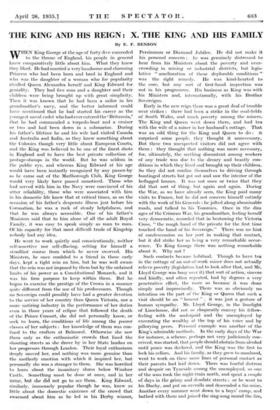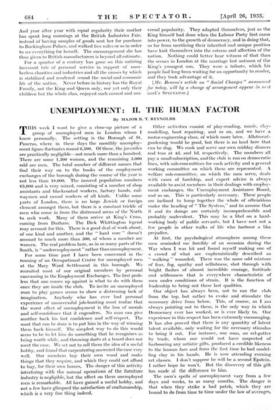THE KING AND HIS REIGN : X. THE KING AND
HIS FAMILY
By E. F. BENSON WHEN King George at the age of forty-five succeeded to the throne of England, his people in general knew comparatively little about him. What they knew they liked. He had married a very handsome and charming Princess who had been born and bred in England and who was the daughter of a woman who for popularity rivalled Queen Alexandra herself and King Edward for geniality. They had five sons and a daughter and their children were being brought up with great - simplicity. Then it was known that he had been a sailor in his grandmother's navy, and the better informed could have mentioned that he had started his career as the youngest naval cadet who had ever entered the Britannia,' that he had commanded a torpedo-boat and a cruiser or. two and had been down in a submarine. During his father's lifetime he and his wife had -visited Canada and Australia and -India, so they knew something about the Colonies though very little about European Courts, and the King was believed to be one of the finest shots in England and to have the best private collection of postage-stamps in the world. But he was seldom in the public eye, and whereas King Edward at his age would have been instantly recognized by any passer-by as he came out of the Marlborough Club, King George would very likely have passed unnoticed. Those who had served with him in the Navy were convinced of his utter reliability, those who were associated with him in his domestic life knew that at critical times, as on the occasion of his father's desperate illness just before his Coronation, he was a rock of steady helpfulness, and that he was always accessible. One of his father's Ministers said that to him alone of all the adult Royal Family, it was easy to speak simply as man to man. 10f his capacity for that most difficult trade of Kingship nobody had any idea.
He went to work quietly and conscientiously, neither self-assertive nor self-effacing, setting for himself a steadfast course from which. he never swerved. His Ministers, he once confided to a friend in those early days, kept a tight rein on him, but he was well aware that the rein was not imposed by them but by the ordained limits of his power as a Constitutional Monarch, and it was his firm purpose to keep within them. But he began to exercise the prestige of the Crown in a manner quite different from the use of his predecessors. Though no Sovereign could possibly have had a greater devotion to the service of her country than Queen Victoria, nor a more untiring industry in the performance of her duties even in those years of eclipse that followed the death of the Prince Consort, she did not personally know, or seek to learn, the conditions of life among the poorer classes of her subjects : her knowledge of them was con- fined to the crofters at Balmoral. Otherwise she saw them only as the enthusiastic crowds that lined the -shouting streets as she drove by in her State landau on her progresses through London. Their loyal enthusiasm deeply moved her, and nothing was more genuine than the motherly emotion with which it inspired her, but personally she was a stranger to them. She was horrified to learn about the insanitary slums below Windsor Castle. Something must be done at • once, and in her name, but she did not go to see them. King Edward, similarly, immensely popular though .he was, knew as little about the domestic existence of the crowd that swarmed about him as he led in his Derby. winner, Persimmon or Diamond Jubilee. He did not make it his personal concern : he was genuinely distressed to hear from his Ministers about the poverty and over- crowding in mining or industrial districts, but legis- lative " amelioration of these deplorable conditions " was the right remedy. He was kind-hearted to the core, but any sort of first-hand inspection was not in his programme. His business as King was with his Ministers and, internationally, with his Brother Sovereigns.
Early in the new reign there was a great deal of trouble over strikes : there had been a strike in the coal-fields of South Wales, and much poverty among the miners. The King and Queen went down there, and had tea with the wife of a miner in her husband's cottage. That was an odd thing for the King and Queen to do : it surprised some people, they thought it unnecessary. But these two unexpected visitors did not agree with them : they thought that nothing was more necessary, for, ultimately, the seething discontent among workers of any trade was due to the dreary and beastly con- ditions in which they lived and brought up their children. So they did not confine themselves to driving through buntinged streets but got out and saw the interior of the beflagged houses. It was not once or twice that they did that sort of thing, but again and again. During the War, as we have already seen, the King paid many visits to France, but he did not concern himself entirely with the work of his Generals : lie jolted along abominable roads, and talked to his Tommies. Once in the dim ages of the Crimean War, his grandmother, feeling herself very democratic, recorded that in bestowing the Victoria Cross, " the rough hand of the private for the first time touched the hand of his Sovereign." There was no hint of condescension on her part in making that contact, but it did strike her as being a very remarkable occur- rence. To King George there was nothing remarkable about it. Why not ?
Such contacts became habitual. Though to have tea in the cottage, of an out-of-work miner does not actually relieve poverty (legislation had to look after that, and Mr. Lloyd George was busy over it) that sort of action, sincere and kindly, and often repeated, had by degrees a very penetrative effect, the more so because it was done simply and improvisedly. There was so obviously no intention on the part of the King or Queen that such a visit should be an " honour " it was just a gesture of human sympathy. Mr. Lloyd George, in the limelight of Limehouse, did not so eloquently convey his fellow- feeling with the underpaid and the unemployed by execrating the wealthy at the top of his voice and by pillorying peers. Personal example was another of the King's admirable methods. In the early days of the War for instance, a scheme, perhaps not very judiciously con- ceived, was started, that people should abstain from alcohol until peace was declared, and the King was the first to lock his cellars. And his family, as they grew to manhood, went to work on these same lines of personal contact as their parents had laid down. There was fearful distress and despair on. Tyneside among the unemployed, so one of the sons took the night-train north, and spent a couple of days in the grimy and desolate streets : or he went to his Duchy, and put on overalls and descended a tin-mine. Another every summer went down to a boys' camp, and bathed with them and joined the sing-song round the fire„ And year after year with equal regularity their mother has spent long mornings at the British Industries Fair, instead of having samples of goods sent her for purchase to Buckingham Palace, and walked five miles or so in order to see everything for herself. The encouragement she has thus given to British manufacturers is beyond all estimate.
For a quarter of a century has gone on this untiring incessant tale of personal service in support of num- berless charities and industries and all the causes by which is stabilized and rendered sound the social and economic life of the nation. Never before in history has the Royal Family, not the King and Queen only, nor yet only their children but the whole clan, enjoyed such earned and uni- versal popularity. They adapted themselves, just as the King himself had done when the Labour Party first came into power, to the growth of democracy, and in doing that, so far from sacrificing their inherited and unique position have knit themselves into the esteem and affection of the nation. Nothing could better bear witness .of that than the scenes in London at the marriage last autumn of the King's youngest son. They were a tribute, which his people had long been waiting for an opportunity to render, and they took advantage of it.
[Mr. Benson's article on " Social Changes" announced for today, will by a change of arrangement appear in next week's SPECTATOR.]











































 Previous page
Previous page